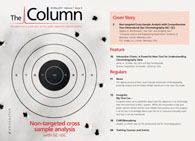Halász Medal
Gyula Vigh, professor of chemistry and holder of the Gradipore Chair of Separation Science at Texas A&M University, has been selected as the 2011 recipient of the Hungarian Society for Separation Sciences (HSSS) Halász Medal Award recognizing research excellence in the separation sciences.
Gyula Vigh, professor of chemistry and holder of the Gradipore Chair of Separation Science at Texas A&M University, has been selected as the 2011 recipient of the Hungarian Society for Separation Sciences (HSSS) Halász Medal Award recognizing research excellence in the separation sciences.
Named in honour of István Halász, who was a leading scientist in gas chromatography and a pioneer in liquid chromatography, the award commends researchers for outstanding achievements in or contributions to the study of separation science. The award will be presented at a ceremony during the 36th International Symposium on High Performance Liquid Phase Separations and Related Techniques, on 19–23 June at the Budapest Congress and World Trade Centre in Budapest, Hungary.
Vigh’s research focuses on analytical chemistry — specifically electrophoresis. His lab is currently investigating isoelectric trapping of ampholytic substances within a device to achieve separation — a vital tool in the purification process for a wide variety of substances, from medications to proteins, in a host of applications.
In addition to being presented with the award during the symposium, Vigh is scheduled to present a plenary lecture explaining his lab’s technique entitled, “A New Preparative-Scale Isoelectrophoretic Trapping Device: Design, Construction and First Characterization.”
To learn more about Vigh and his research, visit www.chem.tamu.edu/faculty/vigh
This story originally appeared in The Column. Click here to view that issue.
Analysis of PFAS in Milk by LC-MS/MS
May 15th 2025Dairy milk is one commodity that can be impacted by environmental contaminants, such as PFAS, so it is important to implement extensive, robust, and accurate testing. In this work, a sensitive and reliable method was developed for the analysis of PFAS in milk by LC-MS/MS at levels as low as 0.01 µg/kg.

.png&w=3840&q=75)

.png&w=3840&q=75)



.png&w=3840&q=75)



.png&w=3840&q=75)











